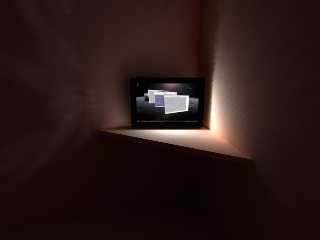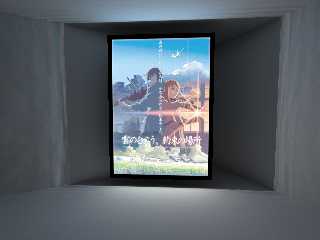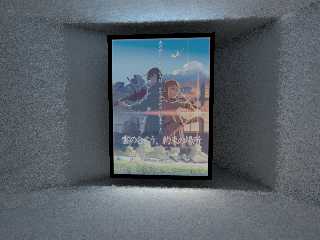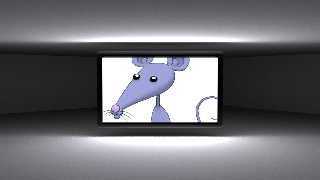 |
 |
|
 |
|
 |
|  |
|  |
|
 |
|
 |
|  |
|  |
|
 |
render time 1:18:08. three noncoincident boxes containing df3s (red,
green, blue) for screen with emitting 10*each colour, 10 brightness
factor for radiosity, 1600 samples, 0.1 error bound, 4 recursion limit,
6 nearest count, 0.01 minimum reuse, 0 grey threshold.
--
Tim Cook
http://empyrean.freesitespace.net
Post a reply to this message
Attachments:
Download 'df3 test.png' (116 KB)
Preview of image 'df3 test.png'

|
 |
|  |
|  |
|
 |
|
 |
|  |
|  |
|
 |
Tim Cook <z99### [at] gmail com> wrote:
> render time 1:18:08. three noncoincident boxes containing df3s (red,
> green, blue) for screen with emitting 10*each colour, 10 brightness
> factor for radiosity, 1600 samples, 0.1 error bound, 4 recursion limit,
> 6 nearest count, 0.01 minimum reuse, 0 grey threshold.
Tim, it's a crazy thing you tried. It did work out, though! The render time
isn't as bad as I would expect with such high settings. The emitting media is
meant to simulate a plasma screen, yes?
I'm not sure if you are aware of this, but there is a way to reduce radiosity
artifacts even when you've reached your 1600 samples limit. You can do this by
adding a tiny surface normal to your objects. I usually use normal{bumps /*.25*/
scale .001} and antialiasing with a low threshold (+a0.01). You should still
keep a low error_bound, but you can get away with lowering the nearest_count
down to 1 and maybe even use a lower samples count.
The biggest problem is reducing the appearance of noise, but with adequate AA
settings you can make things look pretty smooth. IMO, it's preferable to the
standard radiosity artifacts. I think even Thomas would agree :)
Sam com> wrote:
> render time 1:18:08. three noncoincident boxes containing df3s (red,
> green, blue) for screen with emitting 10*each colour, 10 brightness
> factor for radiosity, 1600 samples, 0.1 error bound, 4 recursion limit,
> 6 nearest count, 0.01 minimum reuse, 0 grey threshold.
Tim, it's a crazy thing you tried. It did work out, though! The render time
isn't as bad as I would expect with such high settings. The emitting media is
meant to simulate a plasma screen, yes?
I'm not sure if you are aware of this, but there is a way to reduce radiosity
artifacts even when you've reached your 1600 samples limit. You can do this by
adding a tiny surface normal to your objects. I usually use normal{bumps /*.25*/
scale .001} and antialiasing with a low threshold (+a0.01). You should still
keep a low error_bound, but you can get away with lowering the nearest_count
down to 1 and maybe even use a lower samples count.
The biggest problem is reducing the appearance of noise, but with adequate AA
settings you can make things look pretty smooth. IMO, it's preferable to the
standard radiosity artifacts. I think even Thomas would agree :)
Sam
Post a reply to this message
|
 |
|  |
|  |
|
 |
|
 |
|  |
|  |
|
 |
Samuel Benge wrote:
> Tim, it's a crazy thing you tried. It did work out, though! The render time
> isn't as bad as I would expect with such high settings. The emitting media is
> meant to simulate a plasma screen, yes?
LCD. One of the newfangled insanely-bright ones.
> I'm not sure if you are aware of this, but there is a way to reduce radiosity
> artifacts even when you've reached your 1600 samples limit. You can do this by
> adding a tiny surface normal to your objects. I usually use normal{bumps /*.25*/
> scale .001} and antialiasing with a low threshold (+a0.01). You should still
> keep a low error_bound, but you can get away with lowering the nearest_count
> down to 1 and maybe even use a lower samples count.
> The biggest problem is reducing the appearance of noise, but with adequate AA
> settings you can make things look pretty smooth. IMO, it's preferable to the
> standard radiosity artifacts. I think even Thomas would agree :)
Huh. I should try that. Due to egging on from someone on 4chan's /3/
board, I bit the bullet and finally downloaded the latest beta and am
rendering a version with an image that has a better range of colours.
Holy crap 3.7 is faster than 3.5. So much so that I decided to really
push the settings...
I dropped the brightness from 10 to 2, kept 1600 samples, dropped error
bound to 0.01, 0.005 minimum reuse, 20 nearest count (to keep the sharp
edge of the shadow from being all grainy), but lowered recursion limit to 2.
I wanted to show as much of the colour-bleed effect as possible, so had
to hunt around for a better image...I actually tried setting gray
threshold to less than 0 (shouldn't that in theory increase saturation?
haha) but it only allows 0--1. :(
It's coming along quite nicely. The walls are a bit sluggish, but it
flies through the media itself like it's not even there.
I long for the day when I can use Moray in conjunction with this.
--
Tim Cook
http://empyrean.freesitespace.net
Post a reply to this message
|
 |
|  |
|  |
|
 |
|
 |
|  |
|  |
|
 |
> Samuel Benge wrote:
>> Tim, it's a crazy thing you tried. It did work out, though! The render
>> time
>> isn't as bad as I would expect with such high settings. The emitting
>> media is
>> meant to simulate a plasma screen, yes?
>
> LCD. One of the newfangled insanely-bright ones.
>
>> I'm not sure if you are aware of this, but there is a way to reduce
>> radiosity
>> artifacts even when you've reached your 1600 samples limit. You can do
>> this by
>> adding a tiny surface normal to your objects. I usually use
>> normal{bumps /*.25*/
>> scale .001} and antialiasing with a low threshold (+a0.01). You should
>> still
>> keep a low error_bound, but you can get away with lowering the
>> nearest_count
>> down to 1 and maybe even use a lower samples count.
>> The biggest problem is reducing the appearance of noise, but with
>> adequate AA
>> settings you can make things look pretty smooth. IMO, it's preferable
>> to the
>> standard radiosity artifacts. I think even Thomas would agree :)
>
> Huh. I should try that. Due to egging on from someone on 4chan's /3/
> board, I bit the bullet and finally downloaded the latest beta and am
> rendering a version with an image that has a better range of colours.
> Holy crap 3.7 is faster than 3.5. So much so that I decided to really
> push the settings...
>
> I dropped the brightness from 10 to 2, kept 1600 samples, dropped error
> bound to 0.01, 0.005 minimum reuse, 20 nearest count (to keep the sharp
> edge of the shadow from being all grainy), but lowered recursion limit
> to 2.
>
> I wanted to show as much of the colour-bleed effect as possible, so had
> to hunt around for a better image...I actually tried setting gray
> threshold to less than 0 (shouldn't that in theory increase saturation?
> haha) but it only allows 0--1. :(
>
> It's coming along quite nicely. The walls are a bit sluggish, but it
> flies through the media itself like it's not even there.
>
> I long for the day when I can use Moray in conjunction with this.
>
> --
> Tim Cook
> http://empyrean.freesitespace.net
Emissive media is fast to compute: no shadow tests.
Media don't receive radiosity lighting.
Your media is very bright relative to the surfaces behind it, making the
radiosity sampling for those areas bailout immediately.
End result: your media renders very fast compared to the rest.
Alain
Post a reply to this message
|
 |
|  |
|  |
|
 |
|
 |
|  |
|  |
|
 |
Tim Cook <z99### [at] gmail com> wrote:
> I dropped the brightness from 10 to 2, kept 1600 samples, dropped error
> bound to 0.01, 0.005 minimum reuse, 20 nearest count (to keep the sharp
> edge of the shadow from being all grainy), but lowered recursion limit to 2.
>
Why are you using such a low error_bound? You could easily get away with 10
times that, probably more. Is that the value you came up with through tuning?
Having a higher error_bound would significantly cut the render time and the
required number of samples without a reduction in quality. You might actually
have fewer visible artifacts, because the number of required samples for
smoother lighting would be below 1600.
Too bad it uses media, because MCPov is always neat for these kinds of things.
-Reactor com> wrote:
> I dropped the brightness from 10 to 2, kept 1600 samples, dropped error
> bound to 0.01, 0.005 minimum reuse, 20 nearest count (to keep the sharp
> edge of the shadow from being all grainy), but lowered recursion limit to 2.
>
Why are you using such a low error_bound? You could easily get away with 10
times that, probably more. Is that the value you came up with through tuning?
Having a higher error_bound would significantly cut the render time and the
required number of samples without a reduction in quality. You might actually
have fewer visible artifacts, because the number of required samples for
smoother lighting would be below 1600.
Too bad it uses media, because MCPov is always neat for these kinds of things.
-Reactor
Post a reply to this message
|
 |
|  |
|  |
|
 |
|
 |
|  |
|  |
|
 |
"Tim Cook" <z99### [at] gmail com> wrote in message
news:4b9fdca6@news.povray.org:
> It's coming along quite nicely. The walls are a bit sluggish, but it
> flies through the media itself like it's not even there.
I'd like to see it - Sounds like it will be impressive :) com> wrote in message
news:4b9fdca6@news.povray.org:
> It's coming along quite nicely. The walls are a bit sluggish, but it
> flies through the media itself like it's not even there.
I'd like to see it - Sounds like it will be impressive :)
Post a reply to this message
|
 |
|  |
|  |
|
 |
|
 |
|  |
|  |
|
 |
Reactor wrote:
> Why are you using such a low error_bound? You could easily get away with 10
> times that, probably more. Is that the value you came up with through tuning?
Kind of. More just seeing how much more I could push it while still
having a reasonable render time. Here's the image...6:13:43 with the
adjusted settings, POV 3.7b36.
--
Tim Cook
http://empyrean.freesitespace.net
Post a reply to this message
Attachments:
Download '2010-03-16 df3 test 37b36.png' (273 KB)
Preview of image '2010-03-16 df3 test 37b36.png'

|
 |
|  |
|  |
|
 |
|
 |
|  |
|  |
|
 |
brightness 4
count 100
error_bound 0.2
minimum_reuse 0.15
nearest_count 10
recursion_limit 2
normal on
normal for walls {granite 0.5 scale 0.01}
render time 0:13:50
--
Tim Cook
http://empyrean.freesitespace.net
Post a reply to this message
Attachments:
Download '2010-03-16 df3 test2 37b36.png' (585 KB)
Preview of image '2010-03-16 df3 test2 37b36.png'

|
 |
|  |
|  |
|
 |
|
 |
|  |
|  |
|
 |
Tim Cook <z99### [at] gmail com> wrote:
> brightness 4
> count 100
> error_bound 0.2
> minimum_reuse 0.15
> nearest_count 10
> recursion_limit 2
> normal on
>
> normal for walls {granite 0.5 scale 0.01}
>
> render time 0:13:50
That's terrible! Not the render time, of course, but the quality. Good AA
settings can eliminate most of that static.
I was running some tests yesterday, with OK results, but the render time was way
too high. I'll post the results after this message.
Sam com> wrote:
> brightness 4
> count 100
> error_bound 0.2
> minimum_reuse 0.15
> nearest_count 10
> recursion_limit 2
> normal on
>
> normal for walls {granite 0.5 scale 0.01}
>
> render time 0:13:50
That's terrible! Not the render time, of course, but the quality. Good AA
settings can eliminate most of that static.
I was running some tests yesterday, with OK results, but the render time was way
too high. I'll post the results after this message.
Sam
Post a reply to this message
|
 |
|  |
|  |
|
 |
|
 |
|  |
|  |
|
 |
Samuel Benge wrote:
> I was running some tests yesterday, with OK results, but the render time was way
> too high. I'll post the results after this message.
render options:
+a0.003 +am2 +r3
radiosity{
count 1600 error_bound .2
pretrace_start .08
pretrace_end .02
nearest_count 1
recursion_limit 2
normal on
media on
brightness 3
gray_threshold 0
adc_bailout 1/256
}
walls:
normal{bumps .5 scale .001}
This 960x540 image rendered in 2h:37m:49s.
Too long, IMO.
Post a reply to this message
Attachments:
Download 'mouse2_37_49.jpg' (98 KB)
Preview of image 'mouse2_37_49.jpg'

|
 |
|  |
|  |
|
 |
|
 |
|  |




![]()